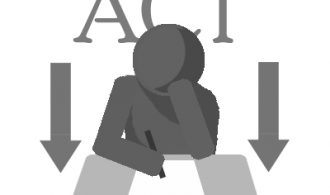ACT Scores Reveal High School Seniors Unprepared for College
MICHELLE LIN
STAFF WRITER
According to ACT’s testing company, the majority of test-takers, close to two-thirds, are not ready for college coursework.
The ACT scores indicate that only 38 percent of seniors demonstrate readiness for college. This two percent drop from last year’s scores alarmed many students, parents and teachers across the nation.
“I think it is because the students are taking too many classes,” math teacher Luis Lopez said. “ They don’t have enough time to master the material.”
While some are expressing concern in regard to the results, Paul Weeks, senior vice president for client relations from the organization of ACT, did not find the results surprising at all. He explained that a number of new states were added to the report this year. Weeks also pointed out that last year only 1.9 million students took the ACT. As for this year, it was a total of 2.1 million students, an increase of about 0.2 million. Unlike last year, more students have decided to take the ACT instead of just the SAT in 2015. For these reasons, Weeks was confident that the increase in test-takers would bring an impact to the test results.
“People need to do more research to get the whole picture,” said Career Technological Education Advisor Janice Liu. Maybe some students did not do so well because they were not familiar with the style of the ACT tests. I’m sure most of them who did really well on the ACT, took preparation classes. The researchers might have to make an actual comparison between those who took prep classes and those who did not and how it affected their performance on the ACT.”
This year’s ACT results also suggest that 61 percent of high school graduates met the English benchmark. As for other subjects, the percentage came in at 44 percent for reading and 41 percent for math. The lowest score being 36 percent for science. Also, Weeks referred to 34 percent of the test-takers as college students who are very likely to struggle in classes. All these indicate the number of students that will succeed or end up retaking courses, which will extend the time they stay in college and a more costly education.
In addition to test scores, the researchers weighed the results along with other factors. According to the report, 49 percent of white test-takers took three or more benchmarks whereas 11 percent of African-Americans and 23 percent of Hispanics did. In terms of geographic location, writer Olivia Quintana from The Boston Globe reported Massachusetts is the state with the highest composite score at 24.8 percent. Connecticut and New Hampshire tied in with an average composite score of 24.5.
On the other hand, more students are attending vocational or technical schools. Two-year degrees have also increased by two percent. As for higher education, the percentage dropped by six percent.
“I can see why the majority of students wouldn’t be ready for college coursework.” said senior Eddie Diaz. “ Every student operates and works differently than others. Some students find doing difficult math problems and reading Shakespeare fun while other students think working with cars and sports is fun. We can only expect the best of our students from subjects and courses they actually love to do,”
